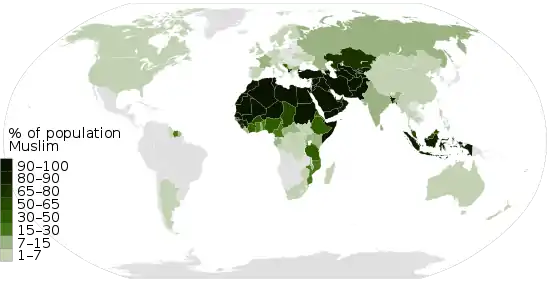Islam in the Solomon Islands
Islam is a minority religion in the Solomon Islands. The religion first entered the country in 1987, when a Ghanaian missionary belonging to the Ahmadiyya movement visited Guadalcanal island on a reconnaissance trip lasting three years. Today, there are two major denominations in the country - Ahmadi Muslims and Sunni Muslims.[1] According to a 2007 report by the United States Department of State's International Religious Freedom Report, there are approximately 350 Muslims in the country.[2] However, different reports suggest that there may be 1000 Ahmadi Muslims in the country alone.[1]
| Islam by country |
|---|
 |
|
|
Sub groups
Ahmadiyya
Islam was first introduced by an Ahmadi Muslim missionary, Hafiz Jibrail from Ghana. He visited the country from 1987 for three years and managed to draw a handful of converts to Islam, after which he left for Ghana. The Community then continued to flourish and practice their faith for a period lasting over a decade, with no external contact from members of the international Ahmadiyya Muslim Community. In the years 2000 to 2005, the Community sent another missionary, as a result of which the Community grew to approximately 1000 members. The Community is headquartered in Honiara, the capital of the Solomon Islands, and is present in the villages of Guadalcanal, Russells, Savo and Bellona islands.[1]
Sunni
Sunni Muslims first entered the country in 1995 as a result of dawah efforts from members of the Tablighi Jamaat. Sunni Muslims have publicly differentiated from Ahmadi Muslims and claim to represent the 'true' orthodox Islam. The Community claims to have more members than the Ahmadiyya Community.[1]
References
- "Muslims in Melanesia: putting security issues in perspective". Australian Journal of International Affairs. Taylor & Francis. 62 (3): 408–429. September 2008.
- "International Religious Freedom Report 2007: Solomon Islands". U.S. Department of State. Retrieved November 6, 2016.